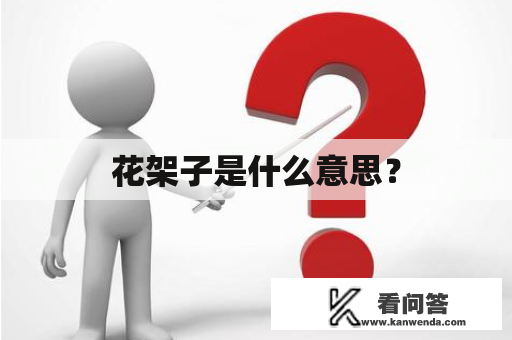花架子是一个常用的形容词,意思是指某人的言行或举止表现出浮夸、虚伪、做作等不真实的一面,给人一种虚假的感觉。这个词语通常用于形容那些装模作样、摆出架子的人。

花架子这个词源于“架子”和“花”,“架子”本来指的是用木头搭建的支架或架子,用来承载不同的物品。而“花”则是指美丽、绚丽的花朵,常用来形容美好的事物。将“架子”和“花”结合在一起,就形成了“花架子”这个词语,表达了美好但虚假的事物、虚伪的行为或言语。
花架子这个词语可以用于形容一个人的言行,也可以用于形容一件事物或某个场合的布置。比如,一个人如果太过于抬高自己、夸大自己的优点,同时对别人故意显示自己的高贵或知识水平,就可以被形容为花架子。而一些商场、酒店等场所,为吸引顾客而进行了过度的装饰或布置,也可以被形容为花架子。
总之,花架子这个词语给我们提供了一个词语来形容那些虚假的行为或言语,提醒人们要保持真实、朴实的态度,不要过度追求表面上的虚荣。
相关词语
虚伪、做作、浮夸、虚荣、装模作样
相关例句
他说话的时候总是太过于花架子,让人不太相信他。
这家酒店的装修太花架子了,显得很不实用。
相关场合
社交场合、商业活动、宴会、婚礼等
What Does "Hua Jia Zi" Mean?
"Hua Jia Zi" is a common Chinese adjective that describes someone who appears ostentatious, pretentious, or insincere. It is used to describe those who are showy or put on airs, giving the impression of being fake or artificial.
The term "Hua Jia Zi" stems from the words "jiazi" and "hua," which mean "rack" or "stand" and "flower," respectively. "Jiazi" originally referred to a wooden frame used to hold or support things, while "hua" is used to describe beautiful and colorful flowers. By combining the two, "Hua Jia Zi" describes something that is beautiful but insincere or artificial.
"Hua Jia Zi" can be used to describe someone's behavior or actions, as well as to describe an event or setting that is over-the-top or ostentatious. For example, a person who exaggerates their accomplishments or intelligence while belittling others can be described as "Hua Jia Zi." Similarly, a shop or restaurant that is overly decorated or embellished to attract customers may be considered "Hua Jia Zi."
In conclusion, "Hua Jia Zi" serves as a reminder to stay true to oneself and avoid pursuing superficial vanity.
Related words
Insincere, pretentious, showy, vain, artificial
Related usage
Social events, business activities, banquets, weddings, etc.
Related examples
He always puts on a "Hua Jia Zi" act, which makes people doubt his sincerity.
The decoration of this hotel is too "Hua Jia Zi," making it impractical and uncomfortable.
Hua Jia Zi, ostentatious, pretentious, insincere, artificial
